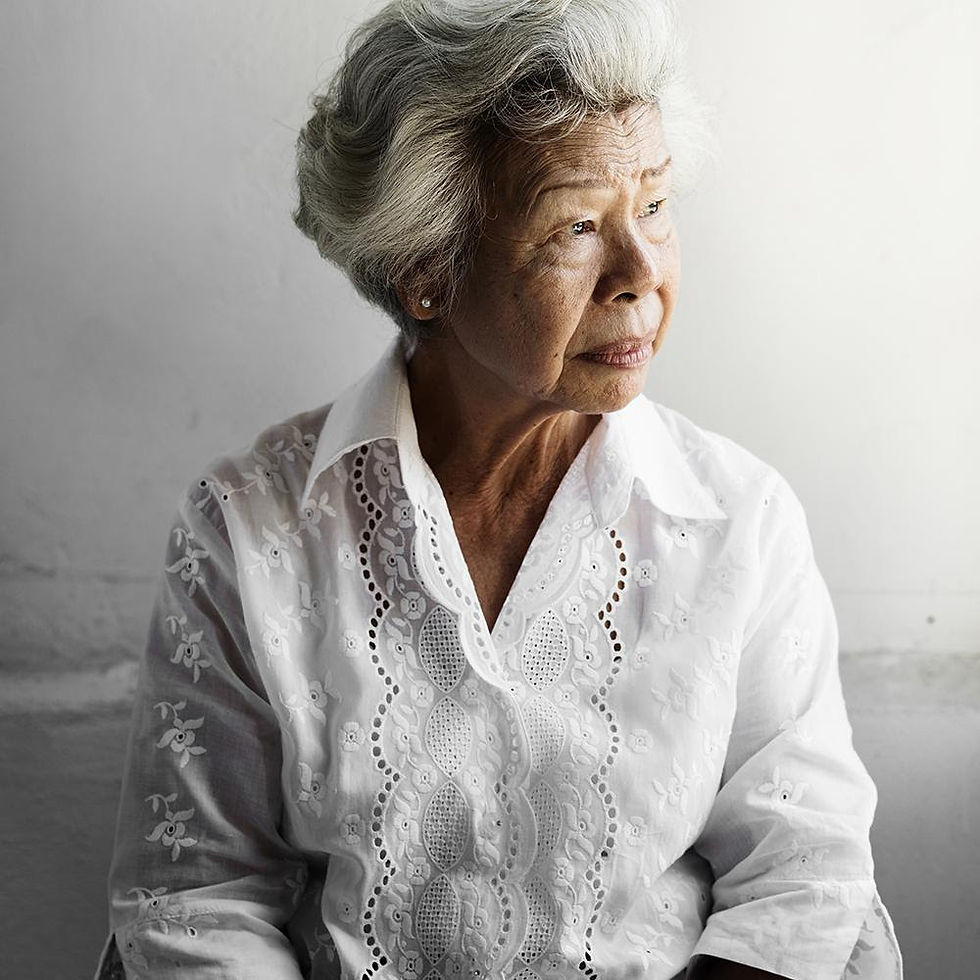Is it Alzheimer's type Dementia or Dementia with Lewy bodies (DLB)?
- Laura Cassell

- Oct 13, 2020
- 3 min read
Updated: Oct 13, 2020
I recently read a very interesting and eye-opening article for one my Aging and Mental Illnesses course at USF. This article inspired me to share what I have learned and in hopes to help those in need of some answers revolving dementia symptoms (especially if your loved one is experiencing visual hallucinations). Here is the full version of the article I'm referring to, I highly recommend checking it out.

Have you been noticing a loved one experiencing visual hallucinations and acting differently? Are these hallucinations causing this person to struggle with their normal activities of daily living? What are the treatment and support options available? Wonder what the diagnosis could be?
If you have answered yes to any of the following questions or are just starting to notice someone possibly experiencing visual hallucinations - here are some symptoms I would look for and then get a proper diagnosis.
What Are Visual Hallucinations?
According to Teeple et. al (2009), Hallucinations, are defined as the perception of an object or event (in any of the 5 senses) in the absence of an external stimulus and are experienced by patients with conditions that span several fields (e.g., psychiatry, neu-rology, and ophthalmology). In this article by Teeple et. al, I found it extremely important to realize that ONLY ONE type of a sensory misperception has to triggered in order for a visual hallucination to occur. Also, there are several different types of visual hallucinations and every one of them can be brought on by a different etiology. According to Assad and Shapiro (who are referenced in Teeple et. al article) they discuss how the genesis of visual hallucinations could either be because of a disturbance of brain structure/anatomy, disturbance of neurotransmitters or a sudden emergence of unconscious into conscious-ness.

According to Teeple et. al (2009), Dementia with Lewy bodies (DLB) is the second most common form of dementia after dementia of the Alzheimer’s type.
How do you know the difference between Alzheimer's type dementia and Dementia with Lewy bodies (DLB)?
Prominent DLB symptoms include:Teeple et. al (2009)
1. Parkinsonism
2. Visual hallucinations
3. Cognitive fluctuations
In 2009, it was recorded that visual hallucinations occur in more than 20% of patients diagnosed with Dementia with Lewy bodies (DLB). If you start to notice your loved one mentioning seeing people, animals and objects that are not actually there - this could be a sign of Dementia with Lewy bodies. Most patients with DLB see people, animals and objects when they hallucinate. Tiraboschi et al. (2019) reported an 83% positive predictive value of visual hallucinations in Dementia with Lewy bodies (DLB) than from Alzheimer's type dementia (meaning visual hallucinations are not a classic symptom of Alzheimer's type dementia). So, a lesson from this is to investigate and learn the different symptoms of each type of dementia. If your loved one is experiencing visual hallucinations DON'T assume they have Alzheimer's type dementia. I highly recommend getting a proper medical evaluation and to schedule brain scans to get a proper diagnosis of your loved ones cognitive disturbances/fluctuations.
Another common dementia type that can create a person to experience visual hallucinations are patients with Parkinson's disease. DLB and Parkinson's disease are very similar with a major difference being the timing of symptoms; the progression of motor symptoms occurring prior to the cognive decline is Parkinson's disease whereas with patients diagnosed with DLB cognitive decline, this progresses faster than motor symptoms do. It's been reported in Teeple et. al (2009), 50% of people with Parkinson's disease experience visual hallucinations. The visual hallucination type is also very similar in Parkinson's and DLB patients both seeing people, objects, animals that are not really there.

I would be happy to help you get connected with a trusted Neurologist or Geriatrician near you, if you would like to get your loved one properly diagnosed. I'm a local Geriatric Care Manager and Certified Dementia Practitioner in NW Florida. I'm an expert in aging care solutions able to guide you to find the best care options for your loved one whether that is getting care in the home or finding a care housing solution in your budget and in your desired location.

Laura Cassell, CDP
Geriatric Care Manager and Gerontologist in NWFL Email: laurav@seniorcareauthority.com
Phone: 850-723-6484




Comments